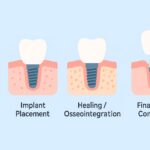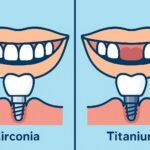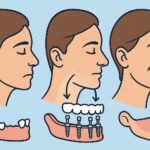Dental implants are one of the most reliable solutions in modern dentistry for replacing missing teeth, but many patients wonder how well they hold up compared to natural teeth. Questions about strength, durability, and daily performance often come up during treatment planning. After all, your teeth endure constant pressure from chewing, biting, and grinding — can implants do the same?
The strength of a dental implant is influenced by the material it’s made from, how it’s anchored in the jawbone, and how well it integrates with surrounding tissue. While they don’t have the exact biological design of natural teeth, high-quality dental implants are engineered to withstand comparable levels of force — sometimes even exceeding the strength of a natural tooth in compromised conditions. This post breaks down the real strength of dental implants and how they compare to the teeth you were born with.
What Are Dental Implants Made Of?
Dental implants are typically made from two primary materials: titanium and zirconia. Both are chosen for their high strength, biocompatibility, and ability to integrate with human bone.
Titanium is the most widely used material in implant dentistry. It’s a lightweight metal with exceptional tensile strength, meaning it can endure significant force without bending or breaking. Titanium also forms a direct bond with the bone in a process called osseointegration, which is crucial for long-term stability. Once fully integrated, a titanium implant becomes almost as secure as a natural tooth root.
Zirconia, a ceramic-based alternative, is gaining popularity for patients seeking a metal-free option. While slightly less flexible than titanium, zirconia implants still offer excellent compressive strength and are resistant to corrosion, wear, and fracture. They’re also highly compatible with soft tissue, making them a suitable option for patients with metal sensitivities.
In both cases, the implant is topped with a custom-made crown, typically made of porcelain or ceramic, designed to withstand normal chewing forces while matching the appearance of natural teeth.
Bite Force: Dental Implants vs. Natural Teeth
Natural teeth are anchored in the jawbone by the periodontal ligament, a network of connective tissue that acts as a shock absorber. This allows for slight movement and provides sensory feedback during chewing — a built-in system that regulates how much pressure you apply when biting.
Dental implants, on the other hand, are fused directly to the bone without a periodontal ligament. While this means they lack the same sensory feedback, it also means they are more rigid and stable under pressure. Once fully healed and integrated, dental implants can typically withstand bite forces of 200–300 pounds per square inch (psi) — which is comparable to or even higher than the average bite force of natural molars.
In fact, because implants are anchored directly into the jawbone, they often distribute force more evenly, especially when placed correctly and supported by healthy bone. The crown attached to the implant is designed to absorb normal chewing pressure and resist wear over time, similar to natural enamel.
The biggest difference lies not in strength, but in sensation. Natural teeth can detect small particles and pressure variations, while implants rely on surrounding tissues and muscles for feedback.
How Long Do Dental Implants Last Under Normal Pressure?
Under normal conditions, dental implants are built to last for 20 years or more, with many lasting a lifetime when properly cared for. Their durability isn’t just about materials — it also depends on how well the implant is placed, how healthy the surrounding bone is, and how much pressure it’s exposed to daily.
Implants can withstand regular chewing and biting forces without weakening. The titanium or zirconia post doesn’t corrode or break down easily, even after decades of use. The crown — which bears the brunt of chewing — may eventually need replacement due to normal wear, but the implant post itself often remains solid.
Several long-term studies show implant success rates of over 95% even after 10+ years, especially in non-smokers with good oral hygiene. That high success rate holds true even in areas of high chewing stress, such as the molars, provided the implant is properly loaded and supported.
However, just like natural teeth, implants require ongoing care. Gum disease, bone loss, and heavy grinding can shorten their functional lifespan. Still, when used under normal pressure and maintained correctly, implants are among the most durable dental restorations available.
Factors That Affect Implant Strength
While dental implants are inherently strong, several external and biological factors can impact their overall durability and long-term performance. Understanding these factors is key to maintaining their strength over time.
1. Bone Density and Quality
The strength of an implant largely depends on how well it integrates with the surrounding jawbone. Patients with high bone density provide better support for the implant, resulting in greater stability and load-bearing capacity. In contrast, patients with low bone volume may require bone grafting to ensure proper anchorage.
2. Placement Technique
Precision in surgical placement is crucial. Poor angulation or improper positioning can create uneven stress on the implant and surrounding bone, increasing the risk of failure. Advanced imaging and guided surgery techniques are now used to improve placement accuracy and reduce complications.
3. Bruxism (Teeth Grinding)
Chronic grinding or clenching of teeth — especially at night — can subject implants to excessive and repeated force. Over time, this can wear down the crown or even loosen the implant. Custom night guards are often recommended to protect implants in patients with bruxism.
4. Oral Hygiene and Maintenance
While implants can’t develop cavities, the surrounding gums and bone are still vulnerable to infection. Peri-implantitis, a condition similar to gum disease, can erode bone around the implant and compromise its support. Daily brushing, flossing, and regular dental checkups are essential to prevent this.
5. Smoking and Systemic Health Issues
Smoking reduces blood flow to the gums and impairs healing, increasing the risk of implant failure. Similarly, uncontrolled diabetes or other systemic conditions can interfere with bone healing and implant integration.
Addressing these factors proactively ensures that the strength and integrity of a dental implant are maintained over the long term.
Can You Break a Dental Implant?
While dental implants are extremely durable, they’re not completely indestructible. However, it’s important to differentiate between breaking the implant post (the part embedded in the bone) and damaging the implant crown (the visible part of the tooth).
Implant Post (Titanium or Zirconia)
Breaking the implant post is very rare. Titanium implants, in particular, have high tensile strength and flexibility, making them resistant to fracture even under heavy pressure. Zirconia implants are more brittle by comparison but still require an unusual amount of force — such as direct trauma or improper placement — to break.
In most clinical situations, implant post fractures occur due to:
- Severe trauma (car accidents, sports injuries)
- Long-term exposure to abnormal bite forces without correction
- Fatigue over decades in poorly supported implants
Implant Crown
The crown attached to the implant can chip, crack, or break, especially if made from porcelain or other ceramic materials. This is similar to what can happen with natural teeth or dental crowns. Fortunately, a damaged crown can be repaired or replaced without affecting the implant post itself.
Implant Screw or Abutment Loosening
In rare cases, the screw that connects the crown to the implant or abutment can loosen or fracture, particularly under extreme bite force or if the bite is misaligned. These mechanical issues are usually fixable without removing the implant.
Conclusion: While dental implants are among the strongest dental solutions available, extreme mechanical stress, poor maintenance, or trauma can compromise them. That said, most issues affect the crown or components, not the implant itself — and are typically repairable.
Conclusion
Dental implants are engineered to be exceptionally strong, often rivaling or even surpassing the strength of natural teeth in certain conditions. While they lack the sensory feedback and natural cushioning of a periodontal ligament, their direct integration with the jawbone gives them unmatched stability and load-bearing capability.
With materials like titanium and zirconia, implants can withstand normal bite forces and daily function for decades. When placed properly and cared for, they offer a long-term solution that doesn’t just restore aesthetics, but full chewing strength and confidence.
For anyone concerned about durability, modern dental implants provide a dependable, long-lasting alternative to natural teeth — built to endure the pressures of everyday life.






